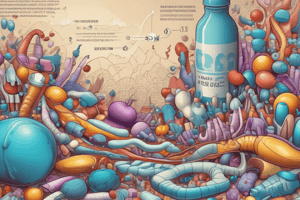Podcast
Questions and Answers
What is a characteristic symptom of serum sickness?
What is a characteristic symptom of serum sickness?
- Immune complex glomerulonephritis
- Anaphylaxis
- Urticaria (hives) (correct)
- Rigor episodes
What is the main advantage of monoclonal antibodies over polyclonal antibodies?
What is the main advantage of monoclonal antibodies over polyclonal antibodies?
- They are less expensive to produce
- They are more easily purified
- They are more specific to an antigen (correct)
- They have a shorter half-life
What is the role of polyethylene glycol (PEG-1500) in the production of monoclonal antibodies?
What is the role of polyethylene glycol (PEG-1500) in the production of monoclonal antibodies?
- It is used to stimulate the immune response
- It is used to purify the antibodies
- It is used as a fusion agent (correct)
- It is used to eliminate normal cells
What is the consequence of hybridization between two normal cells during the production of monoclonal antibodies?
What is the consequence of hybridization between two normal cells during the production of monoclonal antibodies?
What is the purpose of using steroids and analgesics in the treatment of serum sickness?
What is the purpose of using steroids and analgesics in the treatment of serum sickness?
What is the difference between monoclonal and polyclonal antibodies?
What is the difference between monoclonal and polyclonal antibodies?
What is an example of a monoclonal antibody used to treat autoimmune diseases?
What is an example of a monoclonal antibody used to treat autoimmune diseases?
What is the consequence of using monoclonal antibodies in the treatment of autoimmune diseases?
What is the consequence of using monoclonal antibodies in the treatment of autoimmune diseases?
What is the characteristic of monoclonal antibodies produced in multiple myeloma?
What is the characteristic of monoclonal antibodies produced in multiple myeloma?
What is the purpose of hybridoma technology in the production of monoclonal antibodies?
What is the purpose of hybridoma technology in the production of monoclonal antibodies?
Flashcards are hidden until you start studying
Study Notes
Glucocorticoids
- Patients should expect common early adverse effects, such as sweatiness, hoarse voice, loss of appetite, and stimulation.
- Rarely, more serious acute psychiatric disturbances can occur, including agitation, aggression, or psychosis.
- Long-term and less reversible adverse effects include Cushingoid appearance, proximal myopathy, hypertension, hyperlipidaemia, diabetes, cataract formation, peptic ulceration, osteopenia, and aseptic necrosis of bone.
Cytostatics
- Cytostatics inhibit cell division and are used in immunotherapy in smaller doses than in the treatment of malignant diseases.
- They affect the proliferation of both T cells and B cells.
- Examples of cytostatics include alkylating agents (e.g., cyclophosphamide), antimetabolites (e.g., folic acid analogues, purine analogues), and cytotoxic antibiotics (e.g., dactinomycin, anthracyclines, mitomycin C, bleomycin, mithramycin).
Antibodies
- Antibodies are used for quick and potent immunosuppression to prevent acute rejection reactions.
- There are two types of antibodies: polyclonal antibodies and monoclonal antibodies.
- Polyclonal antibodies inhibit T lymphocytes, cause their lysis, and affect all lymphocytes, leading to general immunosuppression and possibly post-transplant lymphoproliferative disorders or serious infections.
- Monoclonal antibodies are directed towards exactly defined antigens and cause fewer side effects.
Immunosuppressive Drugs
- Immunosuppressive drugs reduce the activation or efficacy of the immune system.
- They are used to control severe manifestations of allergic, autoimmune, and organ transplant-related diseases.
- Examples of immunosuppressive drugs include glucocorticoids, cytostatics, and antibodies.
Classification of Immunosuppressive Drugs
- Immunosuppressive drugs can be classified into three major groups: glucocorticoids, cytostatics, and antibodies.
Glucocorticoids
- Glucocorticoids act by inhibiting genes that code for cytokines IL-1, IL-2, IL-3, IL-4, IL-5, IL-6, IL-8, and TNF-γ.
- Examples of glucocorticoids include prednisolone, azathioprine, mycophenolate, and methotrexate.
Monoclonal Antibodies (mAb)
- Monoclonal antibodies are directed towards exactly defined antigens and cause fewer side effects.
- Examples of monoclonal antibodies include muromonab-CD3, Basiliximab, daclizumab, rituximab, and alemtuzumab.
Production of Monoclonal Antibodies
- Monoclonal antibodies are produced in multiple myeloma where only one clone secretes a particular type of antibody.
- In the laboratory, monoclonal antibodies can be generated by hybridoma technology.
- The process of hybridoma technology involves injecting an antigen into mice, fusing spleen cells from immunized mice with mice myeloma cells, and using polyethylene glycol as a fusion agent.
Studying That Suits You
Use AI to generate personalized quizzes and flashcards to suit your learning preferences.




